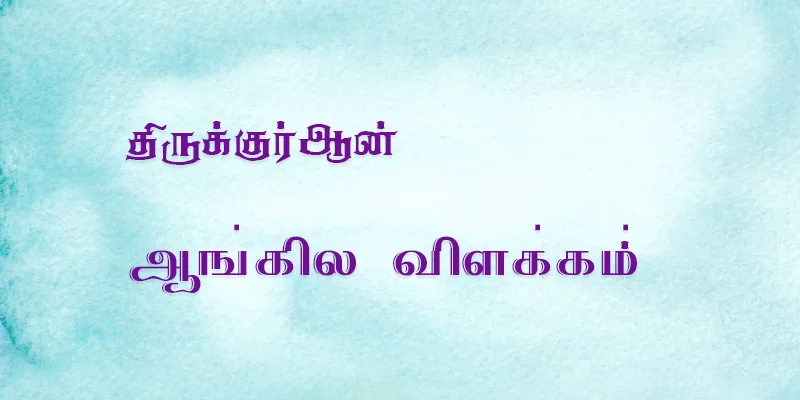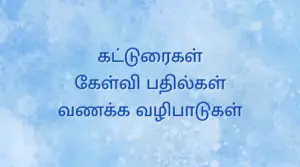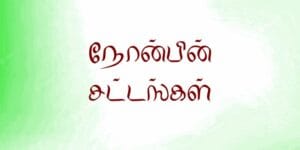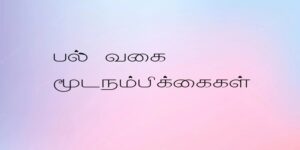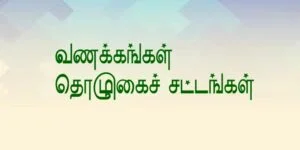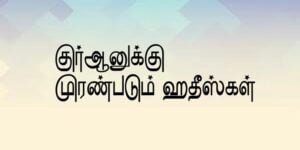8. Are there partners in paradise for women?
In the following verses (2:25, 3:15, 4:57, 36:56, 37:48, 38:52, 44:54, 52:20, 55:56, 55:70, 56:22, 56:35, 78:33) we find the Quran speaking about immaculate partners in paradise and about women partners.
A question now arises: are their male partners for virtuous women in paradise?
To answer this question, one needs to understand the laws of Arabic etymology.
In most languages including Tamil we find only third person singular expressions for men and women having distinct word structure, for example he denotes male gender and her the female.
Third person plural expression does not have a distinct word structure in Tamil. For example, the word ‘they’ denotes a group of people immaterial of gender.
Unlike in other languages we find a distinct word structure for third person plural expressions in Arabic, in denoting male and female genders.
Similarly, when we address someone in the first-person expression, we address them as ‘You’ or ‘You All’. In Tamil language these words are common for both genders. But in the Arabic language first-person addressing words are different for the genders.
When we use the word ‘start worshiping’ it generally applies to both the genders.
But in the Arabic language there is no similar word structure denoting both the genders at the same time.
As an example, we can point out the Arabic word ‘Sallu’ specifically applying to men commanding them to worship.
When we address a group of women the word to be used is ‘Saleena.’
At the time of addressing a group containing men and women together in Arabic it goes like this ‘Oh men start your worship’ and ‘Oh womenfolk start your worship’
Since most of the verses in the Quran address both the sex at the same time, necessitating a repeat of the same for the other sex with a different connotation.
This kind of expressing a command by the Quran addressed to both sex but grammatically written in two separate sentences would increase the volume of the Quran to double the size, and people translating the same to other languages would find it odd. To make short and at the same time not to alienate a language to which it is translated and to address both the sex together the Quran has invented an alternate method.
It expresses all the commands and advice as though addressing men and continues to say it applies also to women.
When Prophet Muhammad (PBUH) was queried by
Ummu Salama (RA) as to why the Quran is addressing only men, in reply verse 33:35 was revealed.
Hadith Book Ahmed 25363.
This verse of the Quran 33:35 cited in this Hadith, implies that whatever is promised for men applies also to women. Verse 4:124 says a virtuous man or woman will not be subjected to any injustice.
Similar messages can be derived from the following verses 3:195, 4:124, 16:97, 40:40.
Men and women who fear Allah and perform good deeds, get equal treatment from Him and the chance of men being awarded exclusively does not arise.
In the following verses 5:119; 9:100; 22:59; 58:22; 88:9; 98:8 we find that in the hereafter everyone gets a satisfying award as per their deeds. Hence, we need to understand that the word ‘everyone’ refers to men as well as women.
So, it must be concluded that Allah does provide partners for women in the hereafter as He does for men. Other than Hur ul Heen the Quran speaks about numerous gifts to be awarded in paradise for men, in all these instances those gifts are referred to in the feminine gender.
In the following verses of the Quran 2:82, 3:15, 3:136, 3:198, 4:13, 4:57, 4:122, 5:85, 5:119, 7:42, 9:22, 9:72, 9:89, 9:100, 10:26, 11:23, 11:108, 14:23, 18:108, 20:76, 21:102, 23:11, 25:16, 25:76, 29:58, 31:9, 39:73, 46:14, 48:5 57:12, 58:22, 64:9, 65:11, 98:8 we find it referring to ones entering paradise as permanent dwellers there.
In all these verses of the Quran we find the use of the word ‘Khali Dhoon’ which means ‘men’ and not in one place can we find the word ‘Khalidah’ meaning ‘women’. But no one takes it in the sense that only men will dwell in paradise permanently, it is to be understood as referring to women as well. While promising paradise for God fearing people the Quran in the following verses3:133, 13:35, 15:45, 16:30, 16:31, 25:15, 26:90, 28:83, 44:51, 50:31, 51:15, 52:17, 52:54, 54:55, 68:34 77:41 addresses them by the word ‘Muttakheen’ in masculine form and not in one occasion does it use the word ‘Muttakiyaad’ a feminine version. This usage does not lead anyone to conclude that only God-fearing men alone deserve paradise. The verses of the Quran3:136, 3:198, 5:65, 9:21, 9:111, 10:9, 13:23, 15:47, 16:31, 18:107, 19:62, 31:8, 32:19 33:44, 34:47, 36:57, 37:42, 38:50, 42:22 by using the word ‘Lahum’ referring men to be worthy of paradise specifies men, which necessarily does not mean no paradise for women. In verse 3:107 of the Quran while referring to the brightness of the face of the paradise dwellers the masculine gender is used for all of them and when mentioning about rivers of milk, honey, and wine in verse 47:15 the Quran says they belong to men. The verses18:31, 22:23, 35:33, 43:71, 52:20, 55:54, 76:13, of the Quran speak about gold ornaments, silk dresses being gifted to men and them reclining on beds are addressed to men. The verses of the Quran 37:45, 38:51, 39:20, 43:73, 52:22, 52:23, 52:24, 56:16-21, 76:5, 76:15, 76:17, 76:19, 77:41, 83:23, 83:25 referring to mansions, cups, forever young serving boys, meat, silver utensils, silver cups, drinks made of a mixture of camphor, drinks made of a mixture of ginger, beds, drinks sealed with musk, springs, shadows, fruits for paradise dwellers are referred to be for men. Saying all these gifts are for virtuous men who did good in this world. The verses of Quran that seem to convey all gifts in paradise are for men only and do not deny these for women are also pointed out by scholars.
The Quran when talking about Hur-ul Ayn mentions partners only for men, is there any mention about partners for women in the hereafter life? So, does it mean that all the pleasures of paradise go only for men, and women are denied these? We do not get any appropriate answer. There is a notion that whoever lived as a husband for a woman in this world continues to be the same in the hereafter. There is not any kind of supporting evidence for this. Then what is the status of a husband who was an evil person in this world. If it so happens that she lived with two different husbands in this world at different times what is her status, when both the husbands are virtuous and with which husband will she be reunited. These are questions likely to be posed.
Prophet Muhammad (PBUH) has guided us to pray for a better partner in the hereafter at funeral prayers of the deceased.
Hadith Book: Muslim 1674, 1675, 1676.Prophet Muhammad’s guidance applies to prayer at the funeral of the deceased from both the sex. From this we could decipher that better partners are there for men as well as women in the hereafter world.
We also come to understand from the Quran that numerous commandments in the Quran though seem to address men are applicable to women as well.
Similarly, the verses in the Quran though seem to address men regarding partners in the hereafter also apply to women could be concluded from the same verses themselves concurring with divine laws and acceptable facts.
